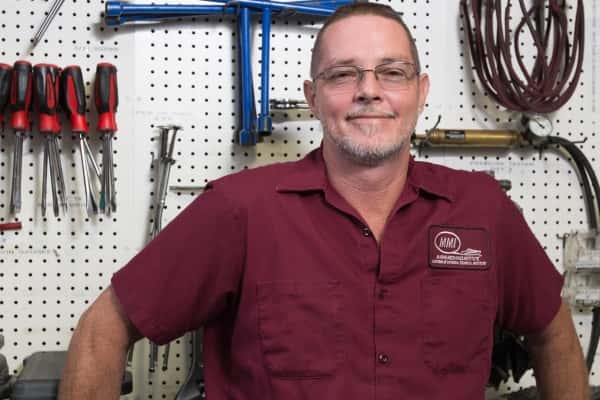Let your skills speak for themselves says Instructor Billy Crosby
"Don’t oversell yourself. Be humble. Let your work show your ability more than your mouth."
*As part of the Universal Technical Institute (UTI) family of schools, Marine Mechanics Institute (MMI) began operating under the UTI brand in February 2025.
Billy Crosby, a Marine Technician Specialist program instructor in Orlando, Florida, will tell you in a sharp southern drawl that he's no stranger to the coast. He’s been working in and around boats for the last 27 years, and though he loves boating, he says, “It’s even more fun to know how to work on them when, at the end of the day, something goes wrong.”
Billy started his career at a boat manufacturer before working for himself doing fiberglass repair. After about 10 years, tired of inhaling dust and sand, he started working on engines. Even though he didn’t learn it all by attending a formal program like the one he teaches, Billy takes continuing education seriously. He’s a Yamaha Master Tech, in fact. And an Evinrude Master Tech. He’s also Mercury Outboard Certified, Mercury Mercruiser Certified and authorized to do repair work for Minn Kota.
Among the courses Billy teaches is the capstone project course, which is one of the last courses students take before graduating and is similar to a final exam. “The capstone class is the most intimidating,” Billy says. “It’s the only class where the students are required to work independently. They have to demonstrate their knowledge, skills and ability all on their own.” Billy loves seeing the light bulbs go off for students in the capstone class and looks forward to the proud student-teacher handshakes when the course is over.
Billy knows that students end up at UTI for a variety of reasons and that their experience levels differ. “Some students have been around boats their whole lives,” he says, “ On the contrary, he explains that others may have seen a commercial about the program and decided to try it out. That means there can be a student who has never held a screwdriver sitting next to a student who can already tune an engine, so instructors must be aware of these differences and make sure that everyone is learning. “Sometimes the best way to deal with this is to let the ones who know what they’re doing answers the questions I pose,” says Billy. “This helps the entire class learn and means the newbies aren’t put on the spot or set up for failure.” If experienced students work quickly through the lab assignments, there are often other things in the classroom that they can move onto. Billy doesn’t care if students give the right answers the first time, he really just wants them to respond so that he can determine their level of understanding.
Billy encourages students to be “Here for learning” and to have a positive attitude. He says students should take advantage of not only the curriculum — including the manufacturer-specific training — but also the instructors. Once students graduate, Billy offers this advice: “Don’t oversell yourself. Be humble. Let your work show your ability more than your mouth.”
If students want to go out on their own, Billy recommends working for a year under someone first. Though career paths vary and are sometimes unpredictable, a typical career path means working your way up — from dealership to rigging to diagnosing.
Billy didn’t have the opportunity to go through a program like the one at UTI when he was younger but says he wishes he had because it would have allowed him to accelerate his career progression.1

